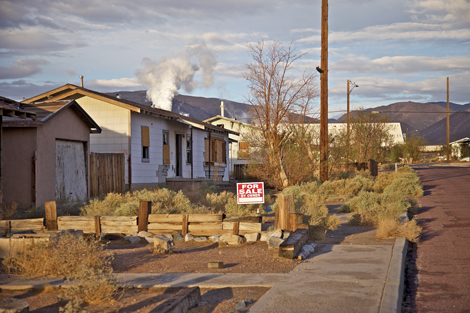Ten years ago, when I learned of the existence of a film called Trona, shot in the desert hellhole of the same name, I feared the worst, especially when I learned that it was a thesis film by a CalArts graduate. It was hard to imagine anybody associated with that bastion of pretension doing justice to this outpost of scorched, menacing and enchanting desolation, where the rank chemical odor from the Searles Valley processing plant hangs heavy over streets lined with dilapidated and burned-out homes; a once-thriving company town, now a bone-dry hotbed of vandalism and meth production, slowly crumbling back into the desert.
I didn’t want this strange place that had captured my heart to enter the popular consciousness by way of some crudely ridiculing film, and warily slipped the disc into the DVD player, only to find any apprehensions immediately dispelled by the opening scene.
So, all right, a scene in which a young businessman presses a paper cup against a motel room wall in order to listen to the couple in the next room having sex doesn’t exactly rank alongside Touch of Evil, Naked Kiss or Paris Texas (a film to which Trona bears a passing resemblance, albeit without taking itself too seriously) as one of the most memorable opening scenes in the history of cinema, but it’s wickedly funny, it sets the tone of consistently droll anomie and establishes the charismatically apathetic hero’s voyeuristic tendencies, which crop up again later.
The nameless hero’s onanistic revelry is interrupted by a reluctantly answered phone call, and once he has quickly disposed of the caller—his wife, who wants to know when he’s coming home and is subsequently not heard from or referred to again—he is disappointed to find that the moaning has subsided.
Without any explanation, he finds himself in the desert, where, after being divested of his suit by a passing motorist on a dirt road, he is left wandering the wilderness in his underwear, carrying a briefcase: the archetypal figure of modern man stripped down and exposed to an alien environment. In the distance, across the salt flats, the lights of Trona twinkle uninvitingly.
After being refused service at the two businesses in town and receiving a mostly frosty reception from the few hard-bitten desert dwellers he encounters, he borrows some clothes, buys an abandoned junkyard and moves into a shack on the premises, presumably for the tranquility and anonymity it affords him.
With no soundtrack other than the wind and its effect on materials—the pages of an old porn magazine rustling in the breeze; a wavering reflection in a pan of oil; the corroded surface of a sun-baked water tank—the silence and stillness of the desert is perfectly captured. Aimless days are spent wandering around piles of mangled vehicles, drinking cheap beer and subsisting on a diet of baked beans and Vienna sausages, eaten straight from the can. At one point a German couple show up and proceed to cheerfully fornicate amid the wreckage, while the hero covertly looks on, wide-eyed and open-mouthed with wonder.
Eventually, boredom drives him into a dismal desert town (identifiable as Ridgecrest), where he rents a dismal motel room and takes himself out to dinner. “I’ll have the lobster dinner and the steak dinner, please,” he tells the alluring Goth waitress who takes his order. She invites him to a Robotussin party where they make out in a stupor while entwined around a toilet bowl.
After an hour of only the most spare dialogue imaginable, the appearance of the waitress’ psychotic, ferret-like brother adds another element to the film: that of speech, or rather, soliloquy. As the cock-blocker from hell, he interrupts a romantic underwater sequence in the motel swimming pool and joins the couple in the motel room where he proceeds to bore them to sleep with his speed-addled ramblings while caressing his wrist with a switchblade: “So you probably saw my crystal collection in there on top of the amps… ”
And so the short film ends as it began, in a motel room, but on this occasion the hero is not alone. The waitress is sleeping beside him—their union frustratingly aborted—and her brother is standing with his back to the bed, pissing on the carpet. Unable to take it any more, the hero rises in the grainy light of dawn and drives off again, destination unknown.
With its unexplicated alienation, passive conviction and deadpan acting from a mostly nonprofessional cast, comparisons with Wim Wenders and Jim Jarmusch are inevitable, but the subdued audacity of this modest treasure has a charm all its own and elicits laughter as dry as its setting. The director, David Fenster, went on to make a film called Pincus that made some noise on the festival circuit, while the lead actor, David Nordstrom, edited another obscure desert-based gem called Little Rock, set in a suburb of Lancaster. The filmmakers clearly know this territory.
As it turns out, any fears concerning the cinematic exploitation of Trona were groundless. Almost nobody saw the film; it didn’t make it into theaters and was hardly even reviewed. Today the town remains as spectacularly blighted as it did 10 years ago, and both of the businesses the hero was turned away from are now closed.


